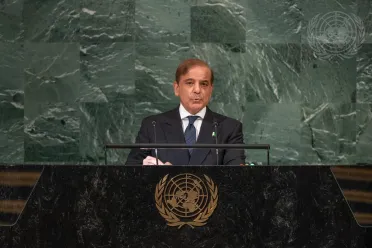Statement
Statement summary
MUHAMMAD SHEHBAZ SHARIF, Prime Minister of Pakistan, describing first-hand the scale and magnitude of the climate catastrophe that has pushed one third of his country under water in a super storm no one has seen in living memory, said: “For 40 days and 40 nights, a biblical flood poured down on us, smashing centuries of weather records, challenging everything we knew about disaster, and how to manage it.” Today, huge swathes of the country are still underwater. In this ground zero of climate change, 33 million people, including women and children are now at high risk from health hazards, with 650,000 women giving birth in makeshift tarpaulins, he added. More than 1,500 people have perished in the great flood, including over 400 children and far more were in peril from disease and malnutrition. Millions of migrants continue to look for dry land with heart-breaking losses to their families, futures and their livelihoods. A million homes have been destroyed and another million damaged, he said, detailing other estimates on damage.
“Pakistan has never seen a stark and devastating example of the impact of global warming. Life in Pakistan has changed forever,” he said, noting that people in Pakistan ask why this has happened to them, especially when the calamity had not been triggered by anything they had done. “Our glaciers are melting fast, our forests are burning and our heat waves have crossed 53°C, making us the hottest place on the planet,” he reported, warning that “what happened in Pakistan will not stay in Pakistan”. Hotspots like his country fall in the list of ten most climate-vulnerable countries yet emit less than one per cent of the greenhouse gases that are burning the planet. He expressed gratitude for the Secretary-General’s visit to his country and his assurance of support and assistance and thanked every country that has sent help in Pakistan’s “most trying hour”. Pakistan has mobilized all available resources towards national relief efforts and repurposed all budget priorities to the rescue and first order needs of millions, among other efforts. The dual costs of global inaction and climate injustice are crippling both its treasury and its people. Unless world leaders act now, “there will no earth to fight wars over”.
His country’s urgent priority is to ensure rapid economic growth and lift millions out of destitution and hunger, he continued. For that, Pakistan needs a stable external environment. Sustainable peace and stability in South Asia remains contingent upon a just and lasting solution of the Jammu and Kashmir dispute. “India’s illegal and unilateral actions of 5 August 2019 to change the internationally recognized ‘disputed’ status of Jammu and Kashmir and to alter the demographic structure of the occupied territory further undermined the prospects of peace and inflamed regional tensions,” he said. Detailing India’s other actions in that regard, he urged that country to take credible steps to create an enabling environment for constructive engagement. he also said his country has led the humanitarian efforts in Afghanistan, and he urged the international community to respond to the Secretary-General's appeal for $4.2 billion in humanitarian and economic assistance and release Afghanistan’s financial reserves.
Pakistan over the last two decades has suffered more than 80,000 casualties and over $150 billion in economic losses due to terrorist attacks, he noted. While its armed forces, with the support of its people, have “broken the back of terrorism” within Pakistan, it continues to suffer terrorist attacks from across its borders, sponsored and financed by its regional adversary. Further, the officially sponsored campaign of oppression against India’s over 200 million Muslims is the worst manifestation of Islamophobia. He voiced hope that the Assembly’s adoption earlier this year of the landmark resolution designating 15 March as the International Day to Combat Islamophobia will lead to concreate measures to combat that and promote interfaith harmony. Also expressing concern about the numerous conflicts across the Middle East, including in Syria and Yemen, he called on Israel to put an immediate end to the blatant use of force against the Palestinian people. Regarding Security Council reform, he urged the addition of 11 new non-permanent members to make it more representative of the international community.
Full statement
Read the full statement, in PDF format.
Photo

Previous sessions
Access the statements from previous sessions.
